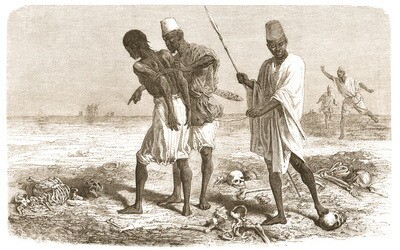“I’m not going to say that the Quran allows something evil” or that Islam’s prophet Muhammad “did something morally evil” declared Jonathan Brown, the Prince Alwaleed bin Talal Chair of Islamic Studies at Georgetown University during an April 26 webinar.
Brown’s zealotry highlighted his disturbing views on Islam and slavery, which caused a storm of criticism in 2017 when he announced that Islamic doctrine forbids an unequivocal denunciation of slavery and rape.
The Saudi-funded Brown has since elaborated on his radical views in his book Islam and Slavery, which he discussed during Comment Magazine‘s “Zealots at the Gate” podcast on “Moral Progress and the Problem of Slavery.” One of the cohosts was Shadi Hamid, a senior fellow at the Brookings Institution’s Center for Middle East Policy and Fuller Seminary assistant research professor of Islamic studies. His colleague Matthew Kaemingk, Fuller’s Richard Norton Mouw Assistant Professor of Faith and Public Life, co-hosted the session.
“Slavery is in the Quran and the precedent of the Prophet Muhammad,” said Brown, and therefore, Islamic law or sharia. Islamic State jihadists used this argument to justify their atrocities, Brown noted in order to explain the conundrum of slavery in Islam. Contrary to some Muslim apologetic attempts to whitewash the topic, he admitted, “You can’t say that the Quran prohibited slavery, because it didn’t.” Thus, the Islamic State’s revival of slave markets, including sex slaves, “was causing a lot of Muslims serious crises in their faith.”
“If you think slavery is a gross and intrinsic evil throughout space and time, somebody who is complicit in that is not a qualified moral role model,” Brown declared. Yet “in the Islamic tradition, prophets are morally upstanding.” This corresponds to Quran 33:21, which proclaims Islam’s founder an eternal exemplary model of human conduct.
I don’t think that all things that we call in history slavery are actually the same and that they deserve the same moral judgment.
By contrast, the Hebrew Bible’s narrative of King David’s adultery with Bathsheba, a popular passage in the Judeo-Christian canon, “is not acceptable from the point of view of the vast majority of Muslim theologians,” Brown emphasized.
Therefore, to conclude that Muhammad committed an inherent evil by practicing slavery “would make me not Muslim,” Brown confessed, even while noting his own revulsion towards human bondage.
To resolve this moral dilemma, he offered various unconvincing apologetics, such as speculation that servitude in Islam was somehow gentler than in other slave systems ubiquitous in human history.
“I don’t think that all things that we call in history slavery are actually the same and that they deserve the same moral judgment,” he said.
The “Atlantic slave trade” practiced by the West, Brown asserted, “is so violent and so grotesque that it really shocked people.” He traced the beginnings of the modern abolitionist movement among Christians to this horror. He did not explain how the Islamic slave trade, with its brutal, often lethal practices including castration, was any milder, or why Muslims, unlike Christian emancipators, remained resolutely committed to slavery.
Brown said that he considers the racist nature of the transatlantic slave trade especially heinous, because the “vast majority of slavery in human history is not justified racially.” Yet this overlooks how Arab enslavement of Africans over centuries promoted persistent racism in Muslim lands.
Notwithstanding the role of the cotton gin in incentivizing America’s plantation slavery system, Brown additionally claimed that technological progress played a key role in ending slavery.
“It is not chance that humans started to come to a new conclusion about the immorality of slavery at the same time that they had discovered that you can use fossil fuels to create steam to move stuff,” he said.
However, as the Islamic State showed, a marked feature of Islamic slavery over the centuries has been its emphasis on sex slavery, in contrast to slavery’s principal utility in the Americas as a source of manpower.
Analyzing abolition, Brown argued that Christians and Muslims have historically practiced “trajectory hermeneutics,” as the “Quran or the Bible doesn’t say slavery’s evil, get rid of it. But it puts us on a trajectory towards that.”
Hamid concurred, saying the “Quran encourages the freeing of slaves” with “really incredible and overwhelming incentives.” This, he said, “implants an ethical premise that leads to the emancipation of slaves.”
Such comments ignore that emancipation in Islam often entailed conversion to Islam, a proselytization effect that only encouraged more enslavement of non-Muslims, something Brown himself has previously noted.
Slavery’s omnipresence throughout history before the onset of the Christian-led abolitionist movement left Brown wondering “how God could ever have allowed something that’s evil.”
Although “Christ is divine” in Christian theology, “Jesus did not forbid slavery,” Hamid argued, although Jesus’s statements heralded the liberation of all “captives,” presumably including slaves, and the Bible does not record everything Jesus said. Jesus’s “apostles included slave owners,” Hamid claimed, without elaborating.
Contrary to Brown and Hamid, Kaemingk, a Christian, noted the Bible’s uniquely liberationist message, which made some of its followers abolitionist trailblazers.
The Bible-inspired human revolution against slavery belies Brown’s equivocating “everyone is doing it” analysis of an inhumane practice.
“Jesus did not condemn the Roman Empire for wars of aggression” along with “a wide variety of moral evils,” Kaemingk noted. He pondered the “mysterious question” that “God is being patient with evil and injustice and violence,” an understanding aligned with the Biblical belief in a loving God who is not dictatorial but appeals to human free will.
As is common, the panelists noted the Hebrew Bible’s references to servitude, but “I think what’s notable about ancient Israelite culture is how restrained any kind of engagement with slavery was,” Kaemingk stated. In particular, the “very first thing that the people of Israel learn about God, their very first encounter with God, is that he hates their slavery.”
Subsequently, all “moral questions” in Judaism result in the “same thing,” namely, “treat the widow and the foreigner like yourselves, because you yourselves were slaves in Egypt,” he said. “God liberated you, so you should liberate others.”
This nuanced biblical rejection of slavery exposes Brown’s tu quoque (“you too”) defense of rigid Islamic orthodoxy. The Bible-inspired human revolution against slavery belies Brown’s equivocating “everyone is doing it” analysis of an inhumane practice, however longstanding. His intellectual contortions may salve his tormented conscience, caught between Islamic fidelity and human decency, but they do not satisfy what should be—but too often are not—the rigorous academic standards in Middle East studies or other disciplines.









